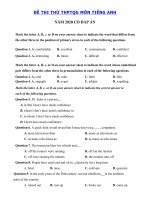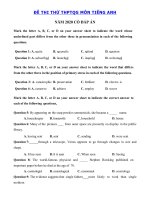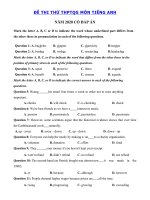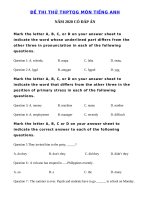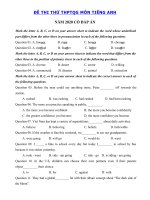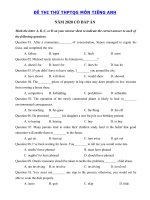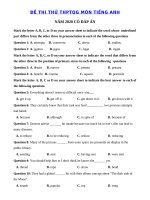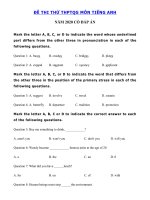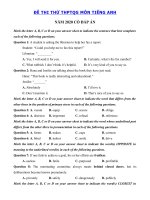- Trang chủ >>
- THPT Quốc Gia >>
- Ngoại Ngữ
Đề thi Tiếng Anh THPT Quốc gia Tuyensinh247 ( có đáp án chi tiết )
Bạn đang xem bản rút gọn của tài liệu. Xem và tải ngay bản đầy đủ của tài liệu tại đây (748.9 KB, 20 trang )
ĐỀ THI THỬ THPT QUỐC GIA MÔN ANH 2017
ĐỀ SỐ 1
Thời gian làm bài: 60 phút ( không kể thời gian phát đề)
(163207) Mark the letter A, B, C or D on your answer sheet to indicate the word whose underlined part is
pronounced differently from that of the rest in each of the following questions.
Question 1: A. tiny
B. island
C. river
D. wind
Question 2: A. removed
B. washed
C. hoped
D. missed
(163210) Mark the letter A, B, C or D on your answer sheet to indicate the word that differs from the rest in
the position of the main stress in each of the following questions.
Question 3: A. escape
B. before
C. enough
D. welfare
Question 4: A. determine
B. encounter
C. consonant
D. disaster
(163213) Mark the letter A, B, C or D on your answer sheet to show the underlined part that needs
correction in each of the following questions.
Question 5: You mustn’t have seen Linda , for she has left for Australia for almost 2 months.
A
B
C
D
Question 6: It was the invention of the assembly line instead than the increase in the average pay of workers
A
that allowed automobiles to be purchased by so many in the early years of the twentieth century.
B
C
D
Question 7: For thousands of years, man has created sweet-smelling substances from wood, herbs, and flowers
A
B
and using them for perfume or medicine.
C
D
(163217) Mark the letter A, B, C or D on your answer sheet to indicate the correct answer to each of the
following questions.
Question 8: If you have an old blanket, _______ it along so that we have something to sit on at the beach.
A. bring
B. go
C. put
D. keep
Question 9: Measures must be taken to stop nuclear waste being …………at sea.
A. dropped
B. left
C. dumped
D. stored
Question 10: The water park we went to yesterday was fantastic, but the entrance………was a bit expensive.
A. fare
B. cost
C. expense
D. fee
Question 11: The couple were finally……..by the landlord after not paying rent for six months.
A. demolished
B. evicted
C. rejected
D. evacuated
Question 12: I couldn’t believe it when Marcy accused me of ………………in her relationship with Joe.
A. intervening
B. interacting
C. interfering
D. intercepting
Question 13: Do you believe in that old ………….about not walking under a ledder?
A. curse
B. misfortune
C. uncertainty
D. superstition
Question 14: My brother together with my parents..................going to meet my relatives at the airport this
afternoon.
A. are
B. were
C. is
D. was
Question 15: If I had attended the party last night, I.....................able to go to work today.
A. won’t be
B. am not
C. wouldn’t have been
D. wouldn’t be
Question 16: The food being cooked in the kitchen was giving............... a wonderful smell.
A. up
B. off
C. round
D. over
Question 17: Her parents insisted that she ............... until she .................... her degree.
A. stayed / finished
B. would stay / finished
C. stayed / had finished
D. stay / finished
Question 18: Computers make it...............for people to store information and perform their work.
A. easily
B. much easier
C. much more easily D. at ease
Truy cập để học Toán – Lý – Hóa – Sinh – Văn – Anh – Sử - Địa tốt nhất!
1
Question 19: I'm going to an interview. I hope I’ll get the job. Please………… for me.
A. keep your fingers
B. hold your fingers crossed
C. hold your fingers
D. keep your fingers crossed
(163230) Mark the letter A, B, C or D on your answer sheet to indicate the most suitable respond to complete
each of the following exchanges.
Question 20: Tom: “I won the gold medal in the race.”
You: “……………………”
A. Cheers! All the best.
B. That’s all right. Don’t mention it.
C. Well done! I knew you could do it.
D. Good luck! Better luck next time.
Question 21: Tom: “ ……………the film we watched last night?”
Mary: “It is very interesting.”
A. How do you think of
B. What is your opinion about
C. How about your thoughts on
D. What about your feelings with
(163233) Mark the letter A, B, C or D on your answer sheet to indicate the word (s) OPPOSITE in meaning
to the underlined word (s) in the following question.
Question 22: Developments in micro-technology- computers and telecommunication are bound to have a huge
influence on various aspects of our lives.
A. rarely
B. somehow
C. uncertain
D. likely
Question 23: The kidneys play a vital role in maintaining health by removing impurities from the
bloodstream.
A. viable
B. vivid
C. trivial
D. essential
(163236) the letter A, B, C or D on your answer sheet to indicate the word (s) CLOSEST in meaning to the
underlined word (s) in each of the following questions.
Question 24: Before the match, the team has been stretching to prevent injury.
A. Conversely
B. In advance
C. Beginning with
D. Prior to
Question 25: The newspaper reporters bear out what the Minister told yesterday.
A. define
B. confirm
C. support
D. complain
(163239) Mark the letter A, B, C or D on your answer sheet to indicate the sentence that is closest in
meaning to each of the following questions.
Question 26: I will take up golf this year.
A. I will begin to play golf this year.
B. I will build a golf court this year.
C. I will enter a golf competition this year.
D. I will stop playing golf this year.
Question 27: I didn’t know that Joe had to get up early, so I didn’t wake him up.
A. If I had known that Joe had to get up early, I would have woken him up.
B. Provided that I had woken Joe up, I would know that he had to get up early
C. Much as Joe had been woken up, he would have to get up early.
D. Unless I had known that Joe had to get up early, I would have woken him up.
Question 28: John speaks Chinese fluently because he used to live in China for ten years.
A. Suppose John has lived in China for ten years, he can speak Chinese fluently.
B. Provided that John lived in China for ten years, he could speak Chinese fluently.
C. Unless John had lived in China for ten years, he could not have spoken Chinese fluently.
D. John could not speak Chinese fluently if he had not lived in China for ten years.
(163243) Mark the letter A, B, C or D on your answer sheet to indicate that best combine this pair of
sentences in the following questions.
Question 29: The jeans are over there. I told you about them last week.
A. The jeans about whom I told you about last week are over there.
B. The jeans which I told you about them last week are over there.
Truy cập để học Toán – Lý – Hóa – Sinh – Văn – Anh – Sử - Địa tốt nhất!
2
C. The jeans which I told you about last week are over there.
D. The jeans about that I told you about last week are over there.
Question 30: The government plans to help poorer countries. It plans to cancel all third world debt.
The government plans to help poorer countries so that it cancels all third world debt.
The government plans to help poorer countries by cancelling all third world debt.
The government plans to cancel all third world debt in case it helps poorer countries.
The government plans to help poorer countries with a view to cancelling all third world debt.
(163246) Read the following passage, and mark the letter (A, B, C or D) on your answer sheet to indicate the
correct answer for each of the blanks.
The first question we might ask is: What can you learn in college that will help you in being an employee? The
schools teach a (31)....................... many things of value to the future accountant, doctor or electrician. Do they
also teach anything of value to the future employee? Yes, they teach the one thing that it is perhaps most
valuable for the future employee to know. But very few students bother to learn it. This basic is the skill ability
to organize and express ideas in writing and in speaking. This means that your success as an employee will
depend on your ability to communicate with people and to (32)....................... your own thoughts and ideas to
them so they will both understand what you are driving at and be persuaded.
Of course, skill in expression is not enough by itself. You must have something to say in the first place. The
effectiveness of your job depends (33)....................... your ability to make other people understand your work as
they do on the quality of the work itself.
Expressing one’s thoughts is one skill that the school can really teach. The foundations for (34)………….in
expression have to be laid early: an interest in and an ear for language; experience in organizing ideas and data,
in brushing aside the irrelevant, and above all the (35)………. of verbal expression. If you do not lay these
foundations during your school years, you may never have an opportunity again.
Question 31: A. large
B. great
C. far
D. deal
Question 32: A. interpret
B. give out
C. transfer
D. present
Question 33: A. on most
B. most on
C. much on
D. on much
Question 34:A. method
B. skill
C. way
D. pattern
Question 35:A. habit
B. routine
C. trend
D. hobby
(163252) Read the following passage, and mark the letter (A, B, C or D) on your answer sheet to indicate the
correct answer to each question.
Certainly no creature in the sea is odder than the common sea cucumber. All living creature, especially
human beings, have their peculiarities, but everything about the little sea cucumber seems unusual. What else
can be said about a bizarre animal that, among other eccentricities, eats mud, feeds almost continuously day
and night but can live without eating for long periods, and can be poisonous but is considered supremely edible
by gourmets?
For some fifty million years, despite all its eccentricities, the sea cucumber has subsisted on its diet of
mud. It is adaptable enough to live attached to rocks by its tube feet, under rocks in shallow water, or on the
surface of mud flats. Common in cool water on both Atlantic and Pacific shores, it has the ability to suck up
mud or sand and digest whatever nutrients are present.
Sea cucumbers come in a variety of colors, ranging from black to reddish – brown to sand – color and
nearly white. One form even has vivid purple tentacles. Usually the creatures are cucumber – shaped – hence
their name – and because they are typically rock inhabitants, this shape, combined with flexibility, enables them
to squeeze into crevices where they are safe from predators and ocean currents.
Although they have voracious appetites, eating day and night, sea cucumbers have the capacity to
become quiescent and live at a low metabolic rate-feeding sparingly or not at all for long periods so that the
marine organisms that provide their food have a chance to multiply. If it were not for this faculty, they would
devour all the food available in a short time and would probably starve themselves out of existence.
But the most spectacular thing about the sea cucumber is the way it defends itself. It major enemies are
fish and crabs, when attacked; it squirts all its internal organs into the water. It also casts off attached structures
Truy cập để học Toán – Lý – Hóa – Sinh – Văn – Anh – Sử - Địa tốt nhất!
3
such as tentacles. The sea cucumber will eviscerate and regenerate itself if it is attacked or even touched; it will
do the same if surrounding water temperature is too high or if the water becomes too polluted.
Question 36: What does the passage mainly discuss?
A. The reason for the sea cucumber’s name
B. What makes the sea cucumber unusual
C. How to identify the sea cucumber
D. Places where the sea cucumber can be found
Question 37: The word “bizarre” is closest meaning to….
A. odd
B. marine
C. simple
D. rare
Question 38: According to the passage, why is the shape of sea cucumbers important?
A. It helps them to digest their food.
B. It helps them to protect themselves from danger.
C. It makes it easier for them to move through the mud.
D. It makes them attractive to fish
Question 39: The words “this faculty” refers to the sea cucumber’s ability to…
A. squeeze into crevices
B. devour all available food in a short time
C. suck up mud or sand
D. live at a low metabolic rate
Question 40: The fourth paragraph of the passage primarily discusses
A. the reproduction of sea cucumbers
B. the food sources of sea cucumbers
C. the eating habits of sea cucumbers
D. threats to sea cucumbers’ existence
Question 41: The phrase “casts off” is closest in meaning to…
A. grows again
B. grabs
C. gets rid of
D. uses as a weapon
Question 42: Which of the following would NOT cause a sea cucumber to release its internal organs into the
water?
A. A touch
B. Food
C. unusually warm water
D. pollution
(163260) Read the following passage, and mark the letter (A, B, C or D) on your answer sheet to indicate the
correct answer to each question.
Human memory, formerly believed to be rather inefficient, is really more sophisticated than that of a computer.
Researchers approaching the problem from a variety of points of view have all concluded that there is a great
deal more stored in our minds than has been generally supposed. Dr. Wilder Penfield, a Canadian
neurosurgeon, proved that by stimulating their brains electrically, he could elicit the total recall of specific
events in his subjects’ lives. Even dreams and other minor events supposedly forgotten for many years suddenly
emerged in detail.
The memory trace is the term for whatever is the internal representation of the specific information about the
event stored in the memory. Assumed to have been made by structural changes in the brain, the memory trace is
not subject to direct observation but is rather a theoretical construct that we use to speculate about how
information presented at a particular time can cause performance at a later time. Most theories include the
strength of the memory trace as a variable in the degree of learning, retention, and retrieval possible for a
memory. One theory is that the fantastic capacity for storage in the brain is the result of an almost unlimited
combination of interconnections between brain cells, stimulated by patterns of activity. Repeated references to
the same information support recall. Or, to say that another way, improved performance is the result of
strengthening the chemical bonds in the memory.
Question 43: Compared with a computer, human memory is...................
A. more complex
B. more limited
C. less dependable
D. less durable
Question 44: The word “that” refers to............................
A. the computer
B. the efficiency
C. the sophistication
D. the memory
Question 45: According the passage, researchers have concluded that......................
A. the mind has a much greater capacity for memory than was previously believed
B. the physical basis for memory is clear
C. different points of view are valuable
D. human memory is inefficient
Question 46: How did Penfield stimulate dreams and other minor events from the past?
Truy cập để học Toán – Lý – Hóa – Sinh – Văn – Anh – Sử - Địa tốt nhất!
4
A. By surgery
B. By electric stimulation
C. By repetition
D. By chemical stimulation
Question 47: The word “elicit” is closest in meaning to...........................
A. prove
B. prevent
C. cause
D. reject
Question 48: According to the passage, the capacity for storage in the brain........................
A. can be understood by the examining the physiology
B. is stimulated by patterns of activity
C. has a limited combination of relationship
D. is not influenced by repetition
Question 49: The word “bonds” means….......................
A. promises
B. agreements
C. connections
D. responsibilities
Question 50: All of the following are true of a memory trace EXCEPT that............................
A. it is probably made by structural changes in the brain
B. it is able to be observed
C. it is a theoretical construct
D. it is related to the degree of recall
..........................................THE END..........................................
Truy cập để học Toán – Lý – Hóa – Sinh – Văn – Anh – Sử - Địa tốt nhất!
5
HƯỚNG DẪN GIẢI CHI TIẾT
Thực hiện: Ban Chuyên môn Tuyensinh247.com
C
A
D
C
A
A
C
A
C
D
Question 1
Question 2
Question 3
Question 4
Question 5
Question 6
Question 7
Question 8
Question 9
Question 10
1.
Question 11
Question 12
Question 13
Question 14
Question 15
Question 16
Question 17
Question 18
Question 19
Question 20
B
C
C
D
B
B
D
B
D
C
Question 21
Question 22
Question 23
Question 24
Question 25
Question 26
Question 27
Question 28
Question 29
Question 30
B
C
C
D
B
A
A
D
C
B
Question 31
Question 32
Question 33
Question 34
Question 35
Question 36
Question 37
Question 38
Question 39
Question 40
B
D
C
B
A
B
A
B
D
C
Question 41
Question 42
Question 43
Question 44
Question 45
Question 46
Question 47
Question 48
Question 49
Question 50
C
Tiny /ˈtaɪni/
Island /ˈaɪlənd/
River /ˈrɪvər/
Wind /wɪnd/ hoặc /waɪnd/
Câu C phát âm là /ɪ/ còn lại là /aɪ/
Chọn C
2.
A
Cách phát âm “ed”
-/id/: âm tận cùng của động từ phát âm là /t/, /d/ => tận cùng của động từ thường là t, te, d, de
-/t/: âm tận cùng của động từ phát âm là /f/, /k/, /p/, /s/, /ʃ/, /tʃ/ => tận cùng của động từ
thường là f, fe, gh, ph, k, ke, p, pe, s, se, ce
-/d/: còn lại
Removed /rɪˈmuːvd/
Washed //wɒʃt/
Hoped /həʊpt/
Missed /mɪst/
Câu A phát âm là /d/ còn lại phát âm là /t/
Chọn A
3.
D
Truy cập để học Toán – Lý – Hóa – Sinh – Văn – Anh – Sử - Địa tốt nhất!
6
C
B
A
D
A
B
C
B
C
B
Escape /ɪˈskeɪp/
Before /bɪˈfɔːr/
Enough /ɪˈnʌf/
welfare /ˈwelfer/
Câu D trọng âm 1 còn lại trọng âm 2
Chọn D
4.
C
Determine /dɪˈtɜːmɪn/
Encounter /ɪnˈkaʊntər/
Consonant /ˈkɒnsənənt/
Disaster /dɪˈzæstər/
Câu C trọng âm 1 còn lại trọng âm 2
Chọn C
5.
A
Mustn’t have seen => can’t have seen
cấu trúc: can’t have Ved/ V3: chắc chắn đã không
Câu này dịch như sau: Chắc chắn bạn đã không nhìn thấy Linda, bởi vì cô ấy đã đến Úc gần 2
tháng.
Chọn A
6.
A
Câu này dịch như sau: Đó chính là sự phát minh của dây chuyển lắp ráp thay vì là việc tăng mức
lương bình quân của công nhân đã cho phép ô tô được mua bán trong những năm đầu của thế kỷ
20.
Instead => rather
Cấu trúc: Instead of = Rather than : thay vì
Chọn A
7.
C
Câu này dịch như sau: Hàng nghìn năm qua, con người đã tạo ra những chất có mùi thơm từ gỗ,
thực vật và hoa và sử dụng chúng để làm nước hoa hoặc dược phẩm.
Truy cập để học Toán – Lý – Hóa – Sinh – Văn – Anh – Sử - Địa tốt nhất!
7
Using => used
Cấu trúc song song: các từ được nối với nhau bằng các liên từ and/ or/ but phải chia dạng giống
nhau.
Eg. She is entelligent and beauty. => Sai => Sửa beauty thành beautiful
Chọn C
8.
A
Bring sth/sb along = take sb/sth with you: mang theo
Go along = go to a place/ event without much planning: đi đến nơi nào đó mà không có kế hoạch
Put along và keep along không tồn tại.
Câu này dịch như sau: Nếu bạn có một chiếc chăn cũ, hayc mang nó theo để chúng ta có cái trải
ra ngồi trên bờ biển.
Chọn A
9.
C
Drop: đánh rơi
Leave: để quên
Dump: đổ đống
Store: cất trữ
Cụm từ: dump waste/rubbish/garbage: thải rác
Drop litter: làm rơi giấy/ xả rác/ vứt rác
Câu này dịch như sau: Những biện pháp phải được thực hiện để ngăn chặn rác thải hạt nhân thải
rác biển.
Chọn C
10.
D
Fare: chi phí ( dùng cho các dịch vụ đi lại)
Cost: chi phí/ kinh phi
Expense: chi tiêu
Fee: phí
cụm từ entrance fee: phí vào cổng
Truy cập để học Toán – Lý – Hóa – Sinh – Văn – Anh – Sử - Địa tốt nhất!
8
câu này dịch như sau: Công viên nước mà chúng tôi đến hôm qua rất thú vị, nhưng phí vào cổng
hơi đắt.
Chọn D
11.
B
Demolish:phá hủy
Evict: đuổi ai ra khỏi nhà ở, đất đai
Reject:bác bỏ ( yêu cầu) / loại bỏ ( thí sinh) / từ chối không tiếp
Evacuated: sơ tán, rút khỏi ( nơi nào, quân sự)
Câu này dịch như sau: Chọn B
12.
C
Intervene: xen vào, can thiệp => mang nghĩa tích cự
Interact:ảnh hưởng lẫn nhau
Interfer...with: can thiệp vào, quấy rầy, gây trở ngại => mang nghĩa tiêu cực
Intercept:chắn, chặn đứng
Câu này dịch như sau: Tôi không thể tin được khi Marcy đã buộc tội tôi can thiệp mối quan hệ
của cô ấy với Joe.
Chọn C
13.
C
Curse: lời thề độc, sự nguyền rủa
Misfortune: sự rủi ro, điều không may
Uncertainty: sự không chắc chắn
Superstition: sự mê tín
Câu này dịch như sau: Bạn có tin vào sự mê tín xa xưa về việc không đi bộ dưới một chiếc thang.
Chọn D
14.
D
Cấu trúc: A + together with/ along with/ accompanied by/ followed by/ as well as + B + V(A)
=> Động từ chia theo chủ ngữ A
chủ ngữ my brother số ít => chọn is
Truy cập để học Toán – Lý – Hóa – Sinh – Văn – Anh – Sử - Địa tốt nhất!
9
câu này dịch như sau: Anh trai tôi cùng với bố mẹ tôi dự định đến gặp họ hàng tại sân bay chiều
nay.
Chọn D
15.
B
Câu điều kiện hỗn hợp: last night => mệnh đề If loại 3, today => mệnh đề chính loại 2
cấu trúc: If S+ had Ved/ V3, S + would/ could/ might Vo
Chọn D
Câu này dịch như sau: nếu tôi tham gia bữa tiệc tối qua, thì hôm nay tôi không thể đi làm.
16.
B
Give up: từ bỏ
Give off : tỏa ra ( sức nóng, mùi, ánh sáng)
Give over: chấm dứt ( không làm một việc gây khó chịu)
Câu này dịch như sau: Thức ăn đang được nấu trong bếp tỏa ra mùi thơm phức.
Chọn B
17.
D
Cấu trúc: S1 + insist (that) S2 + (should) Vo
Chọn D
Câu này dịch như sau: Bố mẹ khăng khăng bảo cô ấy ở lại cho đến khi kết thúc khóa học.
18.
B
Cấu trúc: make sth / it + adj
Chọn B
Câu này dịch như sau: Máy tính làm cho con người dễ dàng hơn khi lưu trữ thông tin và thực
hiện công việc.
19.
D
Thành ngữ: keep your fingers crossed: cầu chúc may mắn
Câu này dịch như sau: Tôi sắp đi phỏng vấn rồi. Tôi hi vọng sẽ được công việc này. Hãy cầu
chúc cho tôi may mắn nhé.
Chọn D
20.
C
Tom: “ Mình đã đoạt được huy chương vàng trong cuộc thi”
Truy cập để học Toán – Lý – Hóa – Sinh – Văn – Anh – Sử - Địa tốt nhất!
10
Bạn: “..........................”
A.
B.
C.
D.
Cạn ly nào! Chúc mọi điều tốt đẹp!
Được rồi. Đừng nhắc đến nó nữa.
Giỏi quá! Mình biết bạn có thể làm được mà.
Chúc may mắn! Lần sau may mắn hơn nhé.
Chọn C
21.
B
Tom:”...........bộ phim chúng ta xem tối qua?”
Mary: “ Nó rất thú vị”
A.
B.
C.
D.
Bạn nghĩ như thế nào về
Ý kiến của bạn về
Những suy nghĩ của bạn về
Cảm xúc của bạn với
Chọn B
22.
C
Rarely: hiếm khi
Somehow: bằng cách nào đó
Uncertain: không chắc chắn
Likely: có vẻ như
Câu này dịch như sau: Những phát triển về máy tính công nghệ vi mô và viễn thông chắc chắn
có ảnh hưởng to lớn đến nhiều lĩnh vực của cuộc sống.
Cấu trúc: be bound to: chắc chắn >< uncertain: không chắc chắn
Chọn C
23.
C
Viable: khả thi , có thể thực hiện được
Vivid: sống động
Trivial: không quan trọng/ tầm thường
Essential: quan trọng, cần thiết
Câu này dịch như sau: Thận đóng vai trò quan trọng trong việc giữ gìn sức khỏe bằng cách loại
bỏ những chất cặn bã từ mạch máu.
Vital: quan trọng >< trivial: không quan trọng
Truy cập để học Toán – Lý – Hóa – Sinh – Văn – Anh – Sử - Địa tốt nhất!
11
Chọn C
24.
D
Conversely: phản đề/ ngược lại
In advance: trước ( dành cho đặt vé / dịch vụ trước ngày khởi hành)
Beginning with: bắt đầu với
Prior to = before: trước khi
Câu này dịch như sau: Trước trận đấu, đội này căng cơ khởi động để tránh bị thương.
Chọn D
25.
B
Define:định nghĩa, xác định
Confirm: xác nhận
Support: ủng hộ
Complain: phàn nàn
Câu này dịch như sau: Các phóng viên của tờ báo xác nhận điều ông Bộ trưởng đã nói hôm qua.
Bear out = confirm: xác nhận
Chọn B
26.
A
Cấu trúc: take up = begin: bắt đầu ( một sở thích/ thói quen)
Câu này dịch như sau: Tôi sẽ bắt đầu chơi golf trong năm nay.
A.
B.
C.
D.
Tôi sẽ bắt đầu chơi golf trong năm nay.
Tôi sẽ xây dựng 1 sân golf trong năm nay.
Tôi sẽ tham gia một cuộc thi golf trong năm nay.
Tôi sẽ nghỉ chơi golf trong năm nay.
Chọn A
27.
A
Câu này dịch như sau: Tôi đã không biết rằng Joe phải dậy sớm, vì vậy tôi đã không đánh thức
anh ấy dậy.
A.
B.
C.
Nếu tôi biết rằng Joe phải dậy sớm tôi sẽ đánh thức anh ấy dậy.
Câu điều kiện loại 3: If S + had Ved/ V3, S + would have Ved/ V3
Nếu tôi đánh thức Joe, tôi sẽ biết anh ấy phải dậy sớm.
Mặc dù Joe đã được đánh thức, anh ấy sẽ phải dậy sớm.
Truy cập để học Toán – Lý – Hóa – Sinh – Văn – Anh – Sử - Địa tốt nhất!
12
D.
Nếu tôi không biết Joe phải dậy sớm, tôi sẽ đánh thức anh ấy.
Chọn A
28.
D
Câu này dịch như sau: John nói tiếng Trung Quốc thành thạo vì anh ấy đã từng ở Trung Quốc
khoảng 10 năm.
A.
giả sử John sống ở Trung Quốc 10 năm, anh ấy có thể nói tiếng Trung Quốc lưu loát.
B.
Nếu John sống ở Trung Quốc 10 năm, anh ấy có thể nói tiếng Trung Quốc lưu loát.
C.
nếu John không sống ở Trung Quốc 10 năm, anh ấy không thể nói tiếng Trung Quốc lưu
loát. => câu điều kiện loại 3 => loại vì ngữ cảnh ở hiện tại và quá khứ nên chỉ dùng câu điều kiện
hỗn hợp.
D.
John không thể nói tiếng Trung Quốc lưu loát nếu anh ấy không từng ở Trung Quốc.=>
Câu điều kiện hỗn hợp
Chọn D
29.
C
Câu này dịch như sau: Những chiến quần jeans ở đằng kia. Mình đã kể bạn nghe về chúng tuần
trước.
A.
Dùng đại từ whom thay thế cho danh từ chỉ vật jeans => sai => loại
B.
Đã dùng đại từ quan hệ which không được dùng “them” => sai => loại
C.
Dúng đại từ quan hệ which thay cho jeans, vì đại từ đóng vai trò tân ngữ nên có thể lược
bỏ => Chọn C
D.
Đã có giới từ “about” không được dùng “that” => loại
Chọn C
30.
B
Câu này dịch như sau: Chính phủ lên kế hoạch giúp đỡ những nước nghèo hơn. Chính phủ có kế
hoạch xóa bỏ tất cả nợ của thế giới thứ 3.
A.
Chính phủ lên kế hoạch giúp đỡ những nước nghèo hơn để mà chính phủ xóa bỏ tất cả nợ
của thế giới thứ 3.
B.
Chính phủ lên kế hoạch giúp đỡ những nước nghèo bằng cách xóa bỏ tất cả nợ của thế
giới thứ 3.
C.
Chính phủ lên kế hoạch xóa bỏ tất cả nợ của thế giới thứ 3 phòng khi nó giúp đỡ những
nước nghèo hơn.
D.
Chính phủ lên kế hoạch giúp đỡ những nước nghèo hơn nhằm xóa bỏ tất cả nợ của thế
giới thứ 3.
Chọn B
31.
B
A great / good many things = many things
Truy cập để học Toán – Lý – Hóa – Sinh – Văn – Anh – Sử - Địa tốt nhất!
13
A great many things : rất nhiều điều
The first question we might ask is: What can you learn in college that will help you in being an
employee? The schools teach a (31)....................... many things of value to the future accountant, doctor
or electrician.Do they also teach anything of value to the future employee? Yes, they teach the one thing
that it is perhaps most valuable for the future employee to know. But very few students bother to learn it.
[ Câu hỏi đầu tiên chúng ta có thể hỏi là: Bạn có thể học gì ở đại học cái mà sẽ giúp bạn trờ
thành một nhân viên? trường học dạy rất nhiều điều giá trị đối với kế toán, bác sĩ hoặc thợ điện
trong tương lai.Liệu chúng cũng dạy bất cứ điều gì có giá trị cho một nhân viên tương lai? Vâng,
chúng dạy một thứ có lẽ quý báu nhất mà một nhân viên tương lai cần biết. Nhưng rất ít học sinh
quan tâm đến việc học nó. ]
Chọn B
32.
D
Interpret: phiên dịch
Give out: cạn kiệt/ dừng hoạt động
Transfer: truyền tải ( cảm xúc/ bệnh tật/ sức mạnh)
Present: trình bày
This basic is the skill ability to organize and express ideas in writing and in speaking. This means that
your success as an employee will depend on your ability to communicate with people and to
(32)....................... your own thoughts and ideas to them so they will both understand what you are
driving at and be persuaded.
[ Điều cơ bản này là kỹ năng sắp xếp và trình bày ý tưởng ở dạng viết và nói. Điều này có nghĩa
là sự thành công của bạn khi là một nhân viên sẽ phụ thuộc vào khả năng giao tiếp với mọi
người và trình bày suy nghĩ của bạn và ý tưởng của bạn đến họ vì vậy họ sẽ hiểu điều bạn đang
hướng đến và bị thuyết phục]
Chọn D
33.
C
Cụm từ: depend much on: phụ thuộc nhều vào
Trạng từ much đặt ngay sau động từ depend
Không dùng most vì trong câu không có mạo từ “the” nên không dùng so sánh nhất
Of course, skill in expression is not enough by itself. You must have something to say in the first place.
The effectiveness of your job depends (33)....................... your ability to make other people understand
your work as they do on the quality of the work itself.
Truy cập để học Toán – Lý – Hóa – Sinh – Văn – Anh – Sử - Địa tốt nhất!
14
[ Dĩ nhiên, mỗi kỹ năng trình bày vẫn chưa đủ. Bạn phải có cái gì đó để nói khi mở đầu. Tình
hiệu quả của công việc phụ thuộc nhiều vào khả năng của bạn làm cho người khác hiểu công
việc của bạn khi họ đánh giá chất lượng của công việc.]
Chọn C
34.
B
Method(n): phương pháp
Skill(n): kỹ năng
Way (n): cách thức
Pattern (n): hình mẫu
Expressing one’s thoughts is one skill that the school can really teach. The foundations for
(34)………….in expression have to be laid early: an interest in and an ear for language;
[ Trình bày suy nghĩ của một người là một kỹ năng mà trường học có thể thật sự dạy. Những nền
tảng dành cho kỹ năng trình bày phải được hình thành sớm: sự thích thú và năng khiếu ngôn ngữ
bẩm sinh]
Chọn B
35.
A
Habit(n): thói quen
Routine(n): công việc thường nhật/ hoạt động hằng ngày
Trend(n): xu hướng
Hobby(n): sở thích
Cụm từ: habit of + danh từ: thói quen
trend for: có xu hướng
experience in organizing ideas and data, in brushing aside the irrelevant, and above all the (35)……….
of verbal expression. If you do not lay these foundations during your school years, you may never have
an opportunity again.
[ có kinh nghiệm trong việc tổ chức ý tưởng và dữ liệu, trong vi phát triển những ý có liên quan,
và trên tất cả là thói quen dùng ngôn ngữ. Nếu bạn không hình thành được những yếu tố này
trong những năm ở trường, bạn sẽ không bao giờ có lại cơ hội này nữa.]
Chọn D
36.
B
Bài đọc chủ yếu thảo luận về vần đề gì?
Truy cập để học Toán – Lý – Hóa – Sinh – Văn – Anh – Sử - Địa tốt nhất!
15
A.
B.
C.
D.
Lý do của tên hải sâm
Điều gì làm cho hải sâm trở nên đặc biệt
Cách để xác định/ nhận diện hải sâm
Những nơi hải sâm có thể được tìm thấy
Chọn B
37.
A
từ “ bizarre” gần nghĩa nhất với...
odd: kỳ lạ
marine: thuộc về đại dương
simple: đơn giản
rare: hiếm hoi/ khan hiếm
bizzarre = odd: kỳ quái
Chọn A
38.
B
Theo bài đọc, tại sao hình dạng của hải sâm rất quan trọng?
A.
Nó giúp chúng tiêu hóa thức ăn
B.
Nó giúp chúng bảo vệ khỏi nguy hiểm
C.
Nó giúp chúng dễ dàng di chuyển trong bùn hơn.
D.
Nó giúp chúng thu hút/ hấp dẫn những con cá.
Dẫn chứng: Usually the creatures are cucumber – shaped – hence their name – and because they are
typically rock inhabitants, this shape, combined with flexibility, enables them to squeeze into crevices
where they are safe from predators and ocean currents.
Chọn B
39.
D
Từ “ this faculty” ám chỉ đến khả năng của hải sâm ...
A.
Chui vào đường nứt
B.
Tiêu thụ tất cả những thức ăn có sẵn trong thời gian ngắn
C.
hút bùn hay cát
D.
sống ở mật độ trao đổi chất thấp
Dẫn chứng: Although they have voracious appetites, eating day and night, sea cucumbers have the
capacity to become quiescent and live at a low metabolic rate-feeding sparingly or not at all for long
periods so that the marine organisms that provide their food have a chance to multiply. If it were not for
this faculty, they would devour all the food available in a short time and would probably starve
themselves out of existence.
Truy cập để học Toán – Lý – Hóa – Sinh – Văn – Anh – Sử - Địa tốt nhất!
16
[ Mặc dù chúng là loài ăn tạp, ăn cả ngày và đêm, hải sâm có khả năng trở nên yên lặng và ở
vùng mật độ thức ăn thấp hoặc không có tí thức ăn nào suốt khoảng thời gian dài để mà những
động vật ở đáy đại dương là thức ăn của chúng có cơ hội sinh sôi nảy nở. Nếu nó không có khả
năng này, chúng sẽ tiêu thụ hết tất cả những thức ăn có sẵn trong thời gian ngắn và sẽ chết đói]
Chọn D
40.
C
Đoạn văn thứ 4 của bài đọc chủ yếu thảo luận về vấn đề gì?
A.
việc tái sản xuất của hải sâm
B.
nguồn thức ăn của hải sâm
C.
thói quen ăn của hải sâm
D.
những mối đe dọa sự tồn tại của hải sâm
Dẫn chứng: Although they have voracious appetites, eating day and night, sea cucumbers have the
capacity to become quiescent and live at a low metabolic rate-feeding sparingly or not at all for long
periods so that the marine organisms that provide their food have a chance to multiply. If it were not for
this faculty, they would devour all the food available in a short time and would probably starve
themselves out of existence.
Chọn C
41.
C
Cụm từ “ cast off” gần nghĩa nhất với...
A.
B.
C.
D.
tăng trưởng lại
chụp lấy, bắt lấy
loại bỏ, trừ khử
làm vũ khí
Dẫn chứng: It also casts off attached structures such as tentacles.
[ Nó cũng loại bỏ những sinh vật kết dính chắng hạn như xúc tua]
cast off = get rid of : loại bỏ, loại trừ
Chọn C
42.
B
Cái nào sau đây không làm cho hải sâm giải phóng những bộ phận bên trong vào trong nước?
A.
một cái chạm
B.
thức ăn
C.
nước ấm bất thường
D.
sự ô nhiễm
Dẫn chứng: The sea cucumber will eviscerate and regenerate itself if it is attacked or even touched; it
will do the same if surrounding water temperature is too high or if the water becomes too polluted.
Truy cập để học Toán – Lý – Hóa – Sinh – Văn – Anh – Sử - Địa tốt nhất!
17
[ Hải sâm sẽ tự giải phẫu và tái tạo nếu nọ bị tấn công, bị chạm phải, nó sẽ làm điều tương tự nếu
nhiệt độ vùng nước xung quanh quá cao hoặc quá ô nhiễm]
Chọn B
43.
A
So với máy tính trí nhớ của con người thì....
A.
phức tạp hơn
B.
giới hạn hơn
C.
ít phụ thuộc hơn
D.
ít bền bỉ hơn
Dẫn chứng: Human memory, formerly believed to be rather inefficient, is really more sophisticated than
that of a computer.
[ Trí nhớ của con người, vốn được cho rằng kém hiệu quả hơn, thật ra phức tạp hơn bộ nhớ của
máy tính]
Chọn A
44.
D
Từ “that” ám chỉ đến...
A.
Máy tính
B.
Tính hiệu quả
C.
sự phức tạp
D.
trí nhớ
Dẫn chứng: Human memory, formerly believed to be rather inefficient, is really more sophisticated than
that of a computer.
Chọn D
45.
A
Theo bài đọc, các nhà khoa học đã kết luận rằng...............
A.
đầu óc có dung tích bộ nhớ lớn hơn so với trước đây
B.
cấu tạo vật lý của bộ nhớ rất rõ ràng
C.
những quan điểm khác nhau rất có giá trị
D.
Bộ nhớ của cong người thì không hiệu quả
Dẫn chứng: Researchers approaching the problem from a variety of points of view have all concluded
that there is a great deal more stored in our minds than has been generally supposed.
[ Các nhà nghiên cứu đang tiếp cận vấn đề này từ nhiều khía cạnh khác nhau đều kết luận rằng
có một lượng lưu trữ nhiều hơn trong đầu óc của chúng ta so với giả sử trước đây]
Chọn A
Truy cập để học Toán – Lý – Hóa – Sinh – Văn – Anh – Sử - Địa tốt nhất!
18
46.
B
Penfield đã kích thích những giấc mơ và những sự kiện nhỏ từ quá khứ như thế nào?
A.
bằng phẫu thuật
B.
bằng kích điện
C.
bằng sự lặp đi lặp lại
D.
bằng chất kích thích
Dẫn chứng: Dr. Wilder Penfield, a Canadian neurosurgeon, proved that by stimulating their brains
electrically, he could elicit the total recall of specific events in his subjects’ lives. Even dreams and other
minor events supposedly forgotten for many years suddenly emerged in detail.
[ Tiến sĩ Wilder Penfield, một bác sĩ giải phẫu thần kinh người Canada, đã chứng minh rằng
bằng cách kích thích não bộ bằng điện, ông có thể gợi ra toàn bộ những ký ức về những sự việc
cụ thể trong cuộc đời của một đối tượng nào đó. Thậm chí những giấc mơ và những sự kiện nhỏ
nhặt được cho rắng đã bị lãng quên nhiều năm cũng đột nhiên hiện lên chi tiết.]
Chọn B
47.
C
Từ “ elicit” gần nghĩa nhất với...........................
A.
chứng minh
B.
ngăn cản
C.
gây ra
D.
từ chối
Dẫn chứng: Dr. Wilder Penfield, a Canadian neurosurgeon, proved that by stimulating their brains
electrically, he could elicit the total recall of specific events in his subjects’ lives.
elicit = prove: gây ra
48.
B
Theo bài đọc thể tích lưu trữ trong não...................
A.
có thể hiểu được bằng cách kiểm tra sinh lý
B.
được kích thích bởi các hoạt động
C.
có sự kết hợp hạn chế của các mối quan hệ
D.
không bị ảnh hưởng bởi sự lặp đi lặp lại
Dẫn chứng: One theory is that the fantastic capacity for storage in the brain is the result of an
almost unlimited combination of interconnections between brain cells, stimulated by patterns of
activity. Repeated references to the same information support recall. Or, to say that another way,
improved performance is the result of strengthening the chemical bonds in the memory.
[ Một lý thuyết cho rằng dung tích của não là kết quả của một sự kết hợp không giới hạn giữa các
tế bào não, được kích thích bởi các hoạt động. Những dữ liệu được lặp lại của cùng một thông tin
Truy cập để học Toán – Lý – Hóa – Sinh – Văn – Anh – Sử - Địa tốt nhất!
19
hỗ trợ gợi nhớ lại. Hoặc, nói cách khác, trí nhớ được cải thiện là kết quả của việc tăng cường kết
hợp giữa các chất trong bộ nhớ]
Chọn B
49.
C
Từ “ bonds” có nghĩa là..................
A.
lời hứa
B.
sự đồng ý/ thỏa thuận
C.
sự kết nối
D.
trách nhiệm
Dẫn chứng: Or, to say that another way, improved performance is the result of strengthening the
chemical bonds in the memory.
Bonds = connections
Chọn C
50.
B
Tất cả những câu sau đây đều đúng về dấu vết của trí nhớ NGOẠI TRỪ...............
A.
Nó có thể được tạo nên bởi những thay đổi về cấu trúc của não bộ
B.
Nó có thể quan sát được
C.
Nó là một kiến trúc lý thuyết
D.
Nó liên quan đến mức độ gợi nhớ
Dẫn chứng: The memory trace is the term for whatever is the internal representation of the
specific information about the event stored in the memory. Assumed to have been made by
structural changes in the brain, the memory trace is not subject to direct observation but is rather
a theoretical construct that we use to speculate about how information presented at a particular
time can cause performance at a later time. Most theories include the strength of the memory
trace as a variable in the degree of learning, retention, and retrieval possible for a memory.
[ Dấu vết của bộ nhớ là thuật ngữ dành cho bất cứ thứ gì là sự đại diện bên trong của thông tin
chi tiết về những sự kiện được lưu trữ trong trí nhớ. Được cho rằng được tạo nên bởi những thay
đổi trong cấu trúc của não bộ, dấu vết bộ nhớ không phải là một vật thể để định hướng quan sát
nhưng hơn cả một cấu trúc lý thuyết cái mà chúng ta dùng để suy nghĩ về cách thông tin được
trình bày như thế nào ở một khoảng thời gian cụ thể có thể làm tái hiện lại sau đó.]
Chọn B
Truy cập để học Toán – Lý – Hóa – Sinh – Văn – Anh – Sử - Địa tốt nhất!
20

